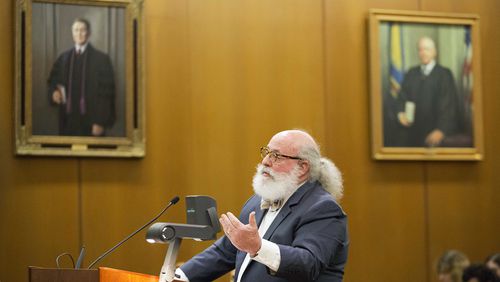The Ku Klux Klan on Monday takes its fight to adopt part of a North Georgia highway to Georgia’s highest court.
For almost three years, the white supremacist group has been trying to get its name on "Adopt-A-Highway" road signs on a one-mile stretch of Ga. 515 in Union County near the North Carolina state line. The Georgia Supreme Court will now hear arguments as to whether a lawsuit filed in September 2012 by the KKK against the state Department of Transportation can proceed toward trial.
The suit was filed a few months after the DOT rejected the “Adopt-A-Highway” request from April Chambers and Harley Hanson, members of the International Keystone Knights of the Ku Klux Klan. In a letter, the state said it was denying the application based on the KKK’s “long-rooted history of civil disturbance” and the “potential for social unrest.”
That was a mistake, the Klan’s lawyer, Alan Begner, said Sunday.
“You can’t deny participation like having your name on a sign based on the content of that person’s speech,” he said. “That’s a core violation of the First Amendment.”
In court filings, the state Attorney General’s Office said the DOT had a legitimate reason to deny the Klan’s application.
“Erecting an (Adopt-A-Highway) Program sign with the KKK’s name on it would have the effect of erecting a sign announcing that ‘the State of Georgia has declared this area Klan Country,’” state attorneys have said. “Such a statement is absurd and would date this state back decades.”
In a prior interview with The Atlanta Journal-Constitution, Steve Chamson, a member of the Keystone Knights said, "We just wanted to do something good. It was a way to do something in a more visible way."
Georgia’s “Adopt-A-Highway” program was created in 1989 and is administered by the DOT. Its purpose is to enlist volunteers to help remove litter from roadsides. Volunteers accepted into the program adopt at least a one-mile stretch of highway and agree to clean up both sides of the road at least four times a year over a two-year period. In return, the state erects signs bearing the party’s name on both sides of the highway.
“Any organization, business, individual, family, city, county, state or federal agency is welcome to apply for participation,” the state DOT’s website says. “Each volunteer group must have at least six members, with three backup members.”
Monday’s arguments will largely focus on the legal doctrine of sovereign immunity, which shields the state and its agencies from being sued. The state is appealing a lower court ruling by Fulton County Superior Court Judge Shawn LaGrua, who found that the KKK’s claims were not barred by sovereign immunity because they involve constitutional claims.
In their legal briefs filed before the state high court, state attorneys said a state constitutional amendment enacted in 1991 reinforced the doctrine of sovereign immunity and “does not allow for exceptions” such as those being raised in the Klan’s case. A ruling by the Georgia Supreme Court in 2014 reaffirmed this principle, the state said.
If the court finds that sovereign immunity bars the enforcement of constitutional rights such as freedom of speech, there will be no way for the courts to protect them when they are abridged by the state, Begner said. “The notion that there could be no remedy is frightening.”







